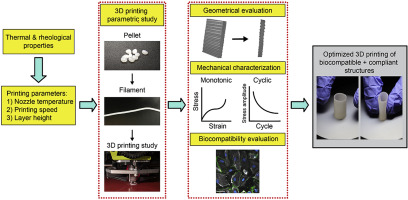Journal of the Mechanical Behavior of Biomedical Materials ( IF 3.3 ) Pub Date : 2020-01-23 , DOI: 10.1016/j.jmbbm.2020.103649 Emilio O Bachtiar 1 , Ozan Erol 1 , Michal Millrod 2 , Runhan Tao 3 , David H Gracias 4 , Lewis H Romer 5 , Sung Hoon Kang 6

|
Recent advancements in 3D printing have revolutionized biomedical engineering by enabling the manufacture of complex and functional devices in a low-cost, customizable, and small-batch fabrication manner. Soft elastomers are particularly important for biomedical applications because they can provide similar mechanical properties as tissues with improved biocompatibility. However, there are very few biocompatible elastomers with 3D printability, and little is known about the material properties of biocompatible 3D printable elastomers. Here, we report a new framework to 3D print a soft, biocompatible, and biostable polycarbonate-based urethane silicone (PCU-Sil) with minimal defects. We systematically characterize the rheological and thermal properties of the material to guide the 3D printing process and have determined a range of processing conditions. Optimal printing parameters such as printing speed, temperature, and layer height are determined via parametric studies aimed at minimizing porosity while maximizing the geometric accuracy of the 3D-printed samples as evaluated via micro-CT. We also characterize the mechanical properties of the 3D-printed structures under quasistatic and cyclic loading, degradation behavior and biocompatibility. The 3D-printed materials show a Young's modulus of 6.9 ± 0.85 MPa and a failure strain of 457 ± 37.7% while exhibiting good cell viability. Finally, compliant and free-standing structures including a patient-specific heart model and a bifurcating arterial structure are printed to demonstrate the versatility of the 3D-printed material. We anticipate that the 3D printing framework presented in this work will open up new possibilities not only for PCU-Sil, but also for other soft, biocompatible and thermoplastic polymers in various biomedical applications requiring high flexibility and strength combined with biocompatibility, such as vascular implants, heart valves, and catheters.
中文翻译:

用于生物医学应用的具有高灵活性和强度的柔软且生物稳定的弹性体的 3D 打印和表征。
3D 打印的最新进展使生物医学工程发生了革命性的变化,能够以低成本、可定制和小批量的制造方式制造复杂且功能性的设备。软弹性体对于生物医学应用特别重要,因为它们可以提供与组织相似的机械性能,并具有改善的生物相容性。然而,具有3D打印能力的生物相容性弹性体非常少,而且人们对生物相容性可3D打印弹性体的材料特性知之甚少。在此,我们报告了一种新框架,可 3D 打印柔软、生物相容且生物稳定的聚碳酸酯基聚氨酯有机硅 (PCU-Sil),且缺陷极少。我们系统地表征了材料的流变学和热学特性,以指导 3D 打印过程,并确定了一系列加工条件。通过参数研究确定打印速度、温度和层高等最佳打印参数,旨在最大限度地减少孔隙率,同时最大限度地提高通过微型 CT 评估的 3D 打印样品的几何精度。我们还表征了 3D 打印结构在准静态和循环载荷下的机械性能、降解行为和生物相容性。 3D 打印材料的杨氏模量为 6.9 ± 0.85 MPa,失效应变为 457 ± 37.7%,同时表现出良好的细胞活力。最后,打印顺应且独立的结构,包括患者特定的心脏模型和分叉动脉结构,以展示 3D 打印材料的多功能性。 我们预计,这项工作中提出的 3D 打印框架不仅将为 PCU-Sil 开辟新的可能性,而且还将为需要高灵活性和强度以及生物相容性的各种生物医学应用中的其他柔软、生物相容性和热塑性聚合物开辟新的可能性,例如血管植入物、心脏瓣膜和导管。











































 京公网安备 11010802027423号
京公网安备 11010802027423号